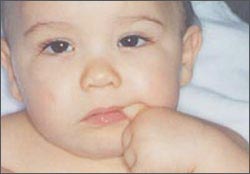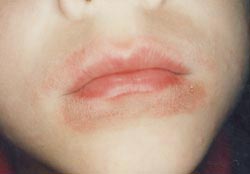입술을 빨거나 무는 버릇, Lips sucking and lips biting
입술을 빨거나 무는 버릇
- 입술을 빠는 영유아가 가끔 있고 9세 이후 학령기 아이도 사춘기 아이도 드물게 자신의 입술을 물거나 빤다.
- 위 입술보다 아래 입술을 더 빠는 경향이 있다.
- 입술을 빨기 때문에 입술 가장자리가 연약해지기도 하고 탈색돼서 입술이 회백색으로 변하기도 하고 심하면 입술이 가늘게 갈라지기도 한다.
- 입술을 빨기도 하고 그와 동시 입술을 물어뜯는 버릇을 하기도 한다.
- 이때도 아래 입술을 주로 물어뜯는다.
- 입술을 물어뜯는 버릇은 생후 4~5개월 된 영아들에게 나타날 수 있으나 생후 10~14개월 이후 영유아들에게는 잘 나타나지 않는다.
- 입술을 심하게 물어뜯을 때는 입술에서 피가 날 수 있다.
- 스트레스를 받거나 정서적으로 불안하면 이 버릇이 무의식적으로 나타나게 된다.
입술을 빨거나 무는 버릇의 원인
- 부모의 불화,
- 집안 식구들의 불안,
- 새 동생을 볼 때,
- 부모와 자식 간에 불화가 있을 때,
- 친 부모형제자매나 교사들이나 또래들이 아이의 옷이나 그의 행동 신체상 등에 관해 흉을 보거나
- 놀림 받거나, 왕따(불링/Bulling)당하거나
- 고독하거나,
- 부모로부터 보살핌과 진정한 사랑을 받지 못하거나 조건 없는 진정한 사랑을 받지 않는다고 느끼거나
- 입술을 물어뜯던지, 입술을 빤다던지, 손톱을 물어뜯거나, 머리카락을 잡아당기거나 꼬거나, 또는 씹는 버릇이 소아청소년들에게 생길 수 있다.
- 손가락을 빨 때는 쾌감을 느끼고 근심 걱정 불안이나 스트레스가 일부 감소될 수 있다.
- 무슨 이유로 화가 나든지 불안하고 걱정하거나 스트레스를 많이 받고 있는 심리상태에서 누구를 육체적으로나 언어적으로 공격하고 싶은 충동이 마음 속에 생길 수 있다.
- 이때 화를 표출하는 방법으로, 또는 스트레스를 해소하는 방법으로 다른 사람을 공격하는 대신에 자기 자신을 공격하는 충동이 무의식적으로 마음속에 생길 때 입술을 깨물거나 손톱을 물어뜯는 등의 행동이 생길 수 있다.

사진 38. 11개월 된 영아가 손가락을 정상적으로 빤다.

사진 39. 입술이 가려워서 입술을 빨 수 있다.
입술을 빨거나 무는 버릇의 치료
- 만족할만한 치료방법은 없다.
- 조건 없는 진정한 사랑을 충분히 해주는 것이 치료의 키이다.
- 벌을 준다든지 혼내준다든지 “그렇게 하지 말라”고 타일러도 아무 효과가 없다.
- 부부 간의 불화 집안의 불화 등이 있으면 해소시킨다.
- 부모 중 한 부모가 그 자녀와 시간을 될 수 있는 대로 많이 내서 함께 놀아 주면서 집중적 관심적 사랑을 충분히 해주면서 그 자녀가 이 세상에서 가장 중요한 자녀라는 것을 알려주고 그 자녀는 그렇게 느끼게 해준다.
- 그 자녀의 단점이나 생김새에 관해 언급하지 말고 흉보지 않는다.
- 여러 자녀들이 있을 때는 특히 편애하지 않는다.
- 그 자녀를 꾸짖거나 조롱해서는 안 된다.
- 정서적으로 불안하고 불만이 생기는 원인을 알아보고 그 근본 원인을 해결해 준다.
- 마음이 편안하고 정신적으로 안정감을 갖고 건전한 자부심을 가지면 이 버릇이 자연히 없어질 수 있다.
- 때로는 그 버릇이 쉽게 없어지지 않을 수 있다.
|
다음은 “입술을 빨거나 무는 버릇, 5세 남자 아이입니다”에 관한 인터넷 소아청소년 건강상담 질의응답의 예 입니다. |
Q&A.입술을 빨거나 무는 버릇, 5세 남자 아이입니다
Q.
9세 누나를 둔 5세 된 남자 아이입니다. 윗니로 아랫 입술을 움켜쥐듯 빨고 있습니다.
달래보고 야단을 쳐도 나중에 보면 자기도 모르게 힘을 주고 있습니다. (어떤 때는 잠잘 때도 입술을 집어 놓고 있습니다.)
24시간 그런 것은 아니지만 아랫 입술이 허옇게 보일 때도 있습니다.
자라나는 아이라 구강이 변형 될까 염려도 됩니다. 어떻게 하면 될까요? 부탁드립니다.
A.
장군님께
안녕하세요. 좋은 질문해 주셔서 감사합니다.
자녀의 나이, 성별, 과거 병력, 가족 병력, 진찰소견, 임상검사 등의 정보를 많이 알수록 답변을 드리는데 도움이 됩니다.
입술을 빨거나 무는 버릇을 참조.
Lips sucking and lips biting
Habit of sucking or biting the lips
• Infants and toddlers sometimes suck on their lips, and infrequently, both school-age children and adolescents after 9 years of age bite or suck their own lips.
• Tends to suck on the lower lip more than the upper lip.
• Sucking the lips can make the edges of the lips soft, discolored, and the lips turn grayish white. In severe cases, the lips can become thin and cracked.
• You have a habit of sucking your lips and biting your lips at the same time.
• Again, bite the lower lip mainly.
• The habit of biting the lips may appear in infants aged 4 to 5 months, but it is less common in children aged 10 to 14 months.
• When you bite your lips hard, your lips may bleed.
• When you are under stress or emotionally unstable, this habit appears subconsciously.
Causes of the habit of sucking or biting the lips
• parental discord;
• Anxiety in family members;
• When I see my new sibling,
• When there is disagreement between parent and child,
• Parents, brothers and sisters, teachers, and peers who are rude about a child’s clothes, behavior, or body image, or
• Being teased or bullied
• loneliness,
• If you feel that you are not being cared for and loved by your parents or that you are not loved unconditionally, or
• Lip biting, lip sucking, fingernail biting, pulling or twisting of hair, or chewing habits may develop in children.
• Sucking your fingers gives you pleasure and may reduce some anxiety, anxiety, and stress.
• No matter what the reason, the urge to attack someone physically or verbally can arise in an anxious, worried, or stressed state of mind.
• Biting your lip or biting your nails can occur when the urge to attack yourself instead of attacking others as an expression of anger or as a way of relieving stress subconsciously arises in your mind. there is.

Picture 38. An 11-month-old infant sucks a finger normally.

Picture 39. Lips are itchy and can be sucked.
Treatment of lip sucking or biting habits
• There is no satisfactory treatment method.
• Giving enough unconditional true love is the key to healing.
• Punishing, scolding, or telling Tyler to “don’t do that” has no effect.
• Discord between husband and wife Resolve any conflicts within the family.
• One parent gives the child and her enough time to play with her as much as she can, giving her enough focused attention and love to let her know and make her feel that she is the most important child in the world.
• Do not comment on the child’s shortcomings or appearance and do not be rude.
• Not particularly favoritism when there are several children.
• Do not scold or ridicule the child.
• Identify the causes of emotional instability and dissatisfaction and address the root causes. • If you are comfortable, mentally stable, and have a healthy sense of self-esteem, this habit can go away naturally.
• Sometimes the habit is not easy to get rid of.
The following is an example of Internet pediatric health counseling Q&A regarding “the habit of sucking or biting lips, a 5-year-old boy”.
Q&A. A habit of sucking or biting lips, a 5-year-old boy
Q. He is a 5-year-old boy with a 9-year-old sister. He is sucking his lower lip with his upper teeth. Even if you try to comfort them and scold them, they give you strength without knowing it when you see them later. (Sometimes I keep my lips together when I sleep.) It’s not like that 24/7, but sometimes the lower lip looks hazy.
As a growing child, there is also a concern that the oral cavity may be deformed. What should I do? please.
A. to the general Hello. Thanks for the nice question. The more information you know about your child’s age, gender, past medical history, family history, examination findings, and clinical tests, the more helpful it is to give you an answer. See also habit of sucking or biting lips.
출처와 참조 문헌 Sources and references
- NelsonTextbook of Pediatrics 22ND Ed
- The Harriet Lane Handbook 22ND Ed
- Growth and development of the children
- Red Book 32nd Ed 2021-2024
- Neonatal Resuscitation, American Academy Pediatrics
- www.drleepediatrics.com 제1권 소아청소년 응급 의료
- www.drleepediatrics.com 제2권 소아청소년 예방
- www.drleepediatrics.com 제3권 소아청소년 성장 발육 육아
- www.drleepediatrics.com 제4권 모유,모유수유, 이유
- www.drleepediatrics.com 제5권 인공영양, 우유, 이유식, 비타민, 미네랄, 단백질, 탄수화물, 지방
- www.drleepediatrics.com 제6권 신생아 성장 발육 육아 질병
- www.drleepediatrics.com제7권 소아청소년 감염병
- www.drleepediatrics.com제8권 소아청소년 호흡기 질환
- www.drleepediatrics.com제9권 소아청소년 소화기 질환
- www.drleepediatrics.com제10권. 소아청소년 신장 비뇨 생식기 질환
- www.drleepediatrics.com제11권. 소아청소년 심장 혈관계 질환
- www.drleepediatrics.com제12권. 소아청소년 신경 정신 질환, 행동 수면 문제
- www.drleepediatrics.com제13권. 소아청소년 혈액, 림프, 종양 질환
- www.drleepediatrics.com제14권. 소아청소년 내분비, 유전, 염색체, 대사, 희귀병
- www.drleepediatrics.com제15권. 소아청소년 알레르기, 자가 면역질환
- www.drleepediatrics.com제16권. 소아청소년 정형외과 질환
- www.drleepediatrics.com제17권. 소아청소년 피부 질환
- www.drleepediatrics.com제18권. 소아청소년 이비인후(귀 코 인두 후두) 질환
- www.drleepediatrics.com제19권. 소아청소년 안과 (눈)질환
- www.drleepediatrics.com 제20권 소아청소년 이 (치아)질환
- www.drleepediatrics.com 제21권 소아청소년 가정 학교 간호
- www.drleepediatrics.com 제22권 아들 딸 이렇게 사랑해 키우세요
- www.drleepediatrics.com 제23권 사춘기 아이들의 성장 발육 질병
- www.drleepediatrics.com 제24권 소아청소년 성교육
- www.drleepediatrics.com 제25권 임신, 분만, 출산, 신생아 돌보기
- Red book 29th-31st edition 2021
- Nelson Text Book of Pediatrics 19th- 21st Edition
- The Johns Hopkins Hospital, The Harriet Lane Handbook, 22nd edition
- 응급환자관리 정담미디어
- Pediatric Nutritional Handbook American Academy of Pediatrics
- 소아가정간호백과–부모도 반의사가 되어야 한다, 이상원 저
- The pregnancy Bible. By Joan stone, MD. Keith Eddleman, MD
- Neonatology Jeffrey J. Pomerance, C. Joan Richardson
- Preparation for Birth. Beverly Savage and Dianna Smith
- 임신에서 신생아 돌보기까지. 이상원
- Breastfeeding. by Ruth Lawrence and Robert Lawrence
- Sources and references on Growth, Development, Cares, and Diseases of Newborn Infants
- Emergency Medical Service for Children, By Ross Lab. May 1989. p.10
- Emergency care, Harvey Grant and Robert Murray
- Emergency Care Transportation of Sick and Injured American Academy of Orthopaedic Surgeons
- Emergency Pediatrics A Guide to Ambulatory Care, Roger M. Barkin, Peter Rosen
- Quick Reference To Pediatric Emergencies, Delmer J. Pascoe, M.D., Moses Grossman, M.D. with 26 contributors
- Neonatal resuscitation Ameican academy of pediatrics
- Pediatric Nutritional Handbook American Academy of Pediatrics
- Pediatric Resuscitation Pediatric Clinics of North America, Stephen M. Schexnayder, M.D.
-
Pediatric Critical Care, Pediatric Clinics of North America, James P. Orlowski, M.D.
-
Preparation for Birth. Beverly Savage and Dianna Smith
-
Infectious disease of children, Saul Krugman, Samuel L Katz, Ann A.
- 제4권 모유, 모유수유, 이유 참조문헌 및 출처
- 제5권 인공영양, 우유, 이유, 비타민, 단백질, 지방 탄수 화물 참조문헌 및 출처
- 제6권 신생아 성장발육 양호 질병 참조문헌 및 출처
-
Neurology in Pediatrics, P. F. Bray, Yearbook Medical Publishers
-
Behavior Disorders in Children, Bakwin and Bakwin
- 소아과학 대한교과서
- 의학 용어사전 대한 의사 협회
Copyright ⓒ 2014 John Sangwon Lee, MD., FAAP
“부모도 반의사가 되어야 한다”-내용은 여러분들의 의사로부터 얻은 정보와 진료를 대신할 수 없습니다.
“The information contained in this publication should not be used as a substitute for the medical care and advice of your doctor. There may be variations in treatment that your doctor may recommend based on individual facts and circumstances.
“Parental education is the best medicine.